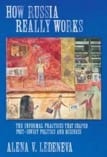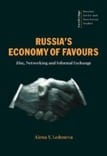Russia’s Civil Society: From Democracy Backpedaling to Informal War
By yjmsgi3, on 30 July 2016
by Professor Alena Ledeneva
Across Central, Eastern Europe and Central Asia, democracy and civil society in the post-communist era are being diverted by informal ties, networks, practices that hide behind democratic institutions. The main problem with powerful informal obligations to family, friends, colleagues and bosses is that they also compromise the state, governance and civil society, especially where clear boundaries between public and private cannot be drawn. Imagine official positions that take over private lives, or having to choose between being a good bureaucrat and a good brother.
I’ve presented my research into informal practices in my trilogy on Russia: Russia’s Economy of Favours, How Russia Really Works, and Can Russia Modernise. In these three books, I take an ethnographic approach towards studying informal practices at different levels and periods, from the Soviet Union to Putin’s Russia. I view communism, its collapse, and the formation of a new system from the perspective of informal practices, and question the predominant discourses of the state, democracy, and civil society, associated with formal institutions.
There are three strands to my argument.
Firstly, the 1990s’ liberal reforms in Russia were originally thought to allow civil society to emerge and get grounded in already existent networks, yet this was not what happened. It turned out that Russia’s informal networks operate according to the ‘us versus them’ logic that is largely self- or network serving, and thus not conducive to civic values.
Secondly, the double standards widespread under the communist oppressive system continue to operate even after the fall of such a regime. The post-communist vacuum was hard to fill, and after a short blip of enthusiasm for democracy in late 1980s and early 1990s, the informal practices in politics – black PR, kompromat, krugovaya poruka (joint responsibility) – have increased people’s cynicism towards the new democratic institutions.
Thirdly, the non-civic nature of informal networks in Russia has also had effects on those in power. On one hand, Putin’s power networks served themselves and reproduced the culture of privileges, which is detrimental to civil society. On the other hand, Putin’s restrictive laws of 2006 and 2011, which, although damaging to existing non-governmental organisations, had the unintended consequence of benefitting civic initiatives emerging ‘bottom-up’. This was illustrated by the Blue Buckets campaign for equality on the roads, and the anti-Putin protests of 2011. The internet has become an important tool for activism, such as the Last Address initiative, whereby people commemorate victims of Stalin’s purges by putting a plaque on their building.
However, since 2012 powerful nationalist propaganda has considerably eroded the atmosphere for bottom-up social initiatives. This was launched by the Kremlin to ensure popular support for the continuing confrontation with the West over the situations in Georgia, Crimea, Eastern Ukraine, Syria and now Turkey. The informal war – an undeclared warfare behind the misleading facades – has gone international. This is not surprising, given the decades-long tradition of informal economy and informal politics. The future is even more worrying, as the number of leaders who admire and emulate the Most Powerful Person in the World is only likely to increase.
Note: This article gives the views of the author(s), and not the position of the SSEES Research blog, nor of the School of Slavonic and East European Studies, nor of UCL
 Close
Close







